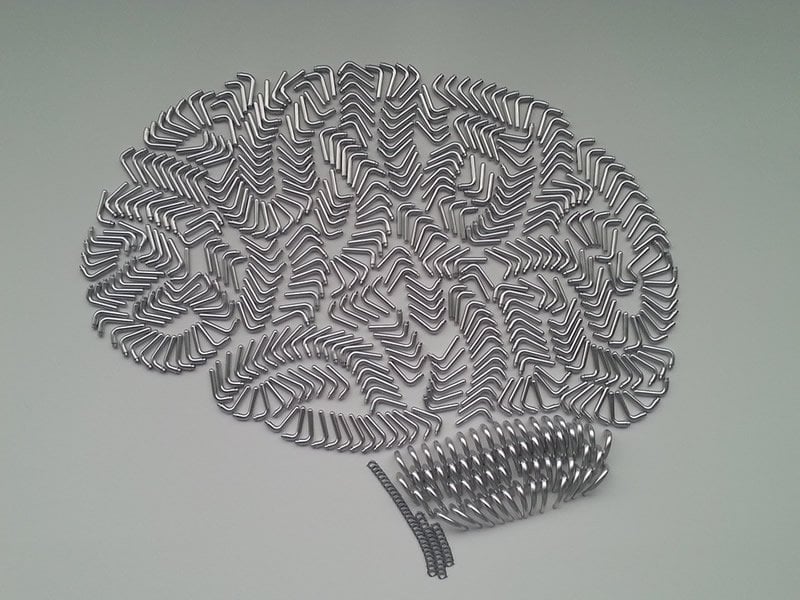Summary: Researchers discovered increased inflammatory activity in a subgroup of patients with frontotemporal dementia. The increased inflammation was indicated by elevated levels of cytokines known to increase inflammatory response and decreased levels of IL-10, which reduces inflammation. The inflammation was associated with Parkinsonism’s symptoms and rapid cognitive and functional decline. The study also revealed patients with FTD are less likely to develop cancer.
Source: University of Eastern Finland
Recent research from the University of Eastern Finland revealed increased inflammatory activity in a subgroup of patients with frontotemporal dementia (FTD). Increased inflammation was associated with parkinsonism symptoms and more rapid disease progression. In addition, the results showed that cancer is rare in FTD, whereas some autoimmune diseases may be more common among FTD patients. These findings may indicate an overactive immune system in FTD.
FTD is the second most common cause of early-onset dementia. Currently, the precise mechanisms causing the disease are unknown, and there are no disease-modifying or curative treatments. Recent studies have indicated that inflammation and autoimmunity in the central nervous system and in peripheral blood may be linked to FTD. Additionally, the most common genetic cause of FTD, the C9orf72 repeat expansion mutation, has been associated with immune system regulation.
Inflammation is associated with more rapid disease progression
The association between systemic inflammation and clinical features of FTD was evaluated by analyzing several inflammatory markers such as cytokines and C-reactive protein (CRP) from FTD patients’ blood samples. The aim was to analyse whether the potential systemic inflammatory changes associated with specific features under the heterogeneous FTD spectrum, including psychotic symptoms, parkinsonism, and disease progression. Increased inflammation in the blood, which was indicated by elevated levels of cytokines that promote inflammation (MCP-1 and RANTES) and decreased levels of cytokine that reduces inflammation (IL-10), were associated with parkinsonism symptoms and more rapid cognitive and functional decline. These findings were recently published in Journal of Neurology.
Cancer is rare among FTD patients
Immune system activity in FTD was also studied by evaluating disease comorbidities in the FTD cohort. An extremely low prevalence of cancer was observed in FTD patients. This supports a recent theory about an inverse association between degenerative diseases and cancer. Previous genetic and immunological studies have indicated that this inverse association may be explained by the opposite genetic activities of cancer and degeneration, and additionally by opposite immunological pathways. Based on the present results, the low prevalence of cancer in FTD may thus be associated with overactive immune system.

The prevalence of autoimmune diseases, in general, was not significantly higher in FTD compared to control groups. On the other hand, especially FTD patients with the C9orf72 repeat expansion mutation had a potential association with an autoimmune skin disease bullous pemphigoid, which was indicated by elevated autoantibody levels in 12.5% of the patients. Previous studies have indicated that autoimmune diseases are more common in FTD in general, but based on these results, the association likely differs between different autoimmune diseases and FTD genotypes.
“In all, this research provides novel insights into the potential contribution of immune system alterations to the pathogenesis and clinical features of FTD. This new information may be utilized in designing further studies and for identifying novel prognostic biomarkers or therapeutic strategies in FTD,” says Kasper Katisko, B.M., from the University of Eastern Finland, who presented the findings in a doctoral thesis focusing on the role of inflammation and immune system function in frontotemporal dementia.
Source:
University of Eastern Finland
Media Contacts:
Kasper Katisko – University of Eastern Finland
Image Source:
The image is in the public domain.
Original Research: Open access
“Peripheral inflammatory markers and clinical correlations in patients with frontotemporal lobar degeneration with and without the C9orf72 repeat expansion”. Katisko et al.
Journal of Neurology doi:10.1007/s00415-019-09552-1.
Abstract
Peripheral inflammatory markers and clinical correlations in patients with frontotemporal lobar degeneration with and without the C9orf72 repeat expansion
In this study, our aim was to evaluate potential peripheral inflammatory changes in frontotemporal lobar degeneration (FTLD) patients carrying or not the C9orf72 repeat expansion. To this end, levels of several inflammatory markers (MCP-1, RANTES, IL-10, IL-17A, IL-12p, IFN-γ, IL-1β, IL-8, and hs-CRP) and blood cells counts in plasma and/or serum of FTLD patients (N = 98) with or without the C9orf72 repeat expansion were analyzed. In addition, we evaluated whether the analyzed peripheral inflammatory markers correlated with disease progression or distinct clinical phenotypes under the heterogenous FTLD spectrum. Elevated levels of pro-inflammatory RANTES or MCP-1 and decreased levels of anti-inflammatory IL-10 were found to associate with Parkinsonism and a more rapid disease progression, indicated by longitudinal measurements of either MMSE or ADCS-ADL decline. These findings were observed in the total cohort in general, whereas the C9orf72 repeat expansion carriers showed only slight differences in IL-10 and hemoglobin levels compared to non-carriers. Furthermore, these C9orf72 repeat expansion-associated differences were observed mostly in male subjects. The females in general showed elevated levels of several pro-inflammatory markers compared to males regardless of the C9orf72 genotype. Our study suggests that pro-inflammatory changes observed in the early symptomatic phase of FTLD are associated with distinct clinical profiles and a more rapid disease progression, and that the C9orf72 repeat expansion and gender may also affect the inflammatory profile in FTLD.






